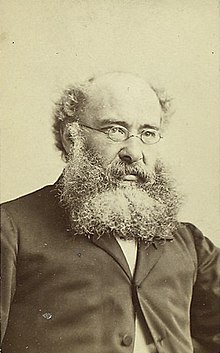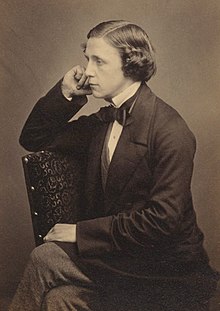 |
| Anthony Trollope |
I really love Victorian British
literature. It’s sort of a hobby of mine. It’s all in public domain now, so I
can download it for free on my Amazon
Kindle and relax from the cares of parish ministry by retreating into a
world where manners were everything, English prose were mellifluous, Victoria
sat enthroned in Britannic glory, and Donald Trump did not exist at all.
Of course, the great paragon of this
period of English letters was Charles Dickens, and I have read through most of
his canon with delight and relish at his quixotic and unforgettable characterizations
and brilliantly convoluted diction. But Dickens wasn’t the only grand voice of
Good Queen Vicky’s reign. I’d like to take the opportunity to celebrate two
other gentlemen who also speak to my sense of lyrical whimsy.
We all should know Lewis Carroll as the
author of Alice’s Adventures in Wonderland
and Through the Looking Glass. These
two wonderful volumes have amused children of all ages for over a century. They
are delightfully whacky and nonsensical. What you may not know, however, is
that Lewis Carroll—whose real name was Charles Dodgson (1832-1898)—was, in
addition to being a mathematics lecturer at Oxford University, an ordained
deacon of the Church of England.
 |
| Lewis Carroll |
I’m including the Reverend Mr. Dodgson in my
hagiology because, after reading a biography of this deeply spiritual man, I
found him to be remarkably liberal in his thinking and, actually, quite ahead of
his time. I’ll site only one example:
As a man of letters, Dodgson was naturally
very fond of Shakespeare. He was also a great, if platonic, friend of the
famous actress Ellen Terry. In a letter to Terry he shared a thought after
having attended a performance of The
Merchant of Venice. Although he always enjoyed the play, Dodgson was deeply
disturbed by the ending in which the Jew Shylock, after losing his court case,
is forced to be baptized as a Christian. Dodgson expressed that he felt forcing
the Jew to abandon his faith was unreasonably cruel and marred Shakespeare’s
otherwise happy ending. He suggested to Terry that the line about Shylock’s
forced conversion be cut from future productions. This seems to me to be
extremely enlightened and ecumenical in a man of the 19th Century.
It speaks to Dodgson’s sense of compassion. As a cleric who is now dealing with
interfaith issues, I have to applaud Deacon Dodgson for expressing a thought
which might have been distasteful and controversial to other churchmen of his
day.
My other champion of Victorian literati is
the far-less-known Anthony Trollope (1815-1882). I doubt students are ever forced
to read Trollope in American high schools, and I guess his effect on English
letters is far less substantial than that of Dickens, Hardy, Elliot, or even
Lewis Carroll. But Trollope certainly speaks to me.
Why? Because he painted so may clerical portraits
in his novels. Many of his characters are Church of England priests, and I have
to say he really seems to get it. (It
also surprised me how little has changed for pastors in over 100 years!) In The Vicar of Bullhampton, a country
parson attempts to rescue a “fallen woman” in his flock, and wonders if he’d
care so much about her if she weren’t young and pretty. In a collection called The Barsetshire Chronicles, Trollope
paints convincing pictures of a henpecked bishop, a conniving chaplain, a morally
conflicted cantor, an archdeacon obsessed with maintaining respect, and a young,
single priest pursued by an amorous parishioner. All of these characters seem
very real to me, and I found comfort in Trollope’s attempt to characterize his
clerics as three-dimensional human beings. After all, pastors are people too.
What most qualifies Trollope for sainthood
in my book, however, is the characterization of women. Whereas Dicken’s women
are either virginal paragons of demure virtue, frightful harpies, or eccentric
crones, Trollope’s ladies are often witty and realistically vulnerable. His
heroine’s aren’t always pretty, and they are frequently complex. Rachel O’Mahoney
of The Landleaguers is feisty and
downright acerbic and has many of the more humorous lines in the novel. Miss
Dunstable, the homely but massively wealthy heiress in Doctor Thorne and Framley Parsonage is at once comic, wise, and truly touching.
Trollope also takes aim at British class
culture. For a man who seems to deeply love the institutions of his native land
and time, he has quite democratic tendencies, and often takes sly aim at people
in high places. Quite naturally, he writes with the strong moral views of his
age, but I don’t think these views are in anyway amiss today.
Should you get the chance, read a little Trollope. You might enjoy him. Or re-read Alice in Wonderland. It will do your heart good.
No comments:
Post a Comment